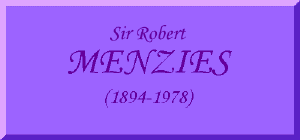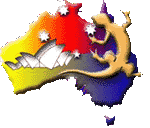|
        |
"First among equals . . . the expositor and the interpreter" was how Menzies described his own style of leadership. Menzies overshadowed many of his colleagues with his powerful personal aura and remarkable gifts of oratory. He dominated Australian politics through the 1950s and '60s and gave Australia a stable conservative political force. It was a time of growth, affluence and rising living standards. Menzies was an ardent Royalist and fostered Australia's association with Britain. He supported American involvement in Vietnam, committing Australian conscripts to fight in 1964. He retired from politics in 1966. Robert Gordon Menzies was born in Jeparit, Victoria on December 20, 1894 into a political family. After a dazzling academic career he graduated with first-class honours, was called to the bar in 1918 and made King's Counsel at age 33. He married Pattie Leckie in 1920, who in 1954 was appointed Dame Grand Cross of the Order of the British Empire. They had three children. His political career began in 1928, first in the Victorian Legislative Council, then in the Legislative Assembly. Menzies helped form the Victorian Branch of the United Australia Party (U.A.P.). Lyons invited him to enter federal politics and on his election was immediately offered the position of attorney-general and deputy leader. This move caused considerable resentment, and Menzies fell out of favour with Lyons. "Pig-Iron Bob," as he was nicknamed when workerside workers refused to load a shipment of iron to Japan, resigned his posts in March 1939. On April 7, Joseph Lyons died. In spite of a bitter personal attack by Earle Page, the caretaker prime minister, Menzies was elected leader of the U.A.P. and became prime minister. World War II began in September. Menzies favoured the idea of a national all-party government, and although he won over the Country Party in 1940, Labor refused to join. In January 1941 Menzies left the country for four months to discuss war matters with Churchill and Roosevelt. His opponents were critical of his long absence at such a crucial time and forced his resignation in August 1941. The U.A.P. split, and Fadden, the nominee of the Country Party, became prime minister for six weeks. When his budget was defeated, the governor-general commissioned Curtin to form a Labor Government. Menzies returned to his law practice, and by 1943 saw a chance to regain control and rebuild the now-factionalised U.A.P. The formation of the Liberal Party was announced in Parliament in 1945. Menzies' Liberal Party became the effective opposition to Labor. Unease about the Chifley Government's plans for nationalisation and resentment of rationing of essential goods like petrol, butter and tea, bolstered the Liberal campaign against socialism and bureaucracy. Menzies' young, enthusiastic Liberal/Country Party coalition was swept into government but faced a hostile senate. Playing on Cold War fears of communism, Menzies introduced the Communist Party Dissolution Bill, which required anyone accused of being a communist to prove his or her innocence. The bill's fundamental reversal of civil liberties led to an immediate High Court challenge. It was defeated in the High Court and at a subsequent referendum but succeeded in casting doubts about the Labor Party. The anti-communist theme continued with Australia's involvement in the Korean War, when Australia committed troops to the United Nations fighting force. In 1951 Australia and New Zealand joined the United States in signing the ANZUS Treaty, Australia's first alliance with a country outside the Commonwealth. The early '50s was a time of spiralling inflation, and Menzies may well have lost the 1954 election but for the Petrov Affair (Hughes). Menzies capitalised on the Liberal's record of anti-communist vigilance by the announcement of a Royal Commission on Espionage. Herbert Evatt, then leader of the Labor Opposition, damaged his party by appearing before the commission. Accusations led to a split in the Labor ranks and the formation of a new party eventually known as the Democratic Labor Party. This rift weakened Labor's electoral prospects for many years. In 1956 both television and the Olympic Games came to Australia. Menzies was the first prime minister to use the new medium in his campaigning, making the most of his skilfully modulated and persuasive voice, his superb acting ability and precise timing. He was a brilliant speaker and revelled in parliamentary debates and interjections. By 1960 the economy was again in trouble, and a massive credit squeeze to control spending hurt many small businesses and homebuyers. Unemployment reached 3.2% (through most of the Menzies era, it was 1.2%). Australia was also concerned about Britain's application to join the European Economic Community, with possible effects on established trade agreements. The 1961 election was very close, with the Liberals winning by one seat. The next elections were held in 1963 shortly after the assassination of John F. Kennedy. Australians returned the Menzies government to power. Menzies supported United States involvement in Vietnam. In 1962 a team of military instructors was sent to Vietnam at the request of the South Vietnamese government. Australia increased its commitment to the Vietnam War in 1964-65 and re-introduced selective conscription. In 1965, Menzies announced that a battalion of national servicemen would be sent on duty to Vietnam in the following year. The battalion left for Vietnam in April 1966. Menzies announced his retirement in 1966 and appointed Harold Holt as his successor. He is the only prime minister ever to retire from office at a time of his own choosing. Knighted, he was made Warden of the Cinque Ports (a ceremonial role) entitling him to reside in England. He died at home in Melbourne in 1978. Copyright unknown
|
|
|
|
[ Virtual
Australia | The
World We Live In | The
Things We Do ]
Problems/Broken Links can be reported
to
All text and
graphics unless otherwise stated are ©1998-2000 Kim Holden, Virtual Australia.
|

![[Visit Oska]](../../images/oska003.gif)
